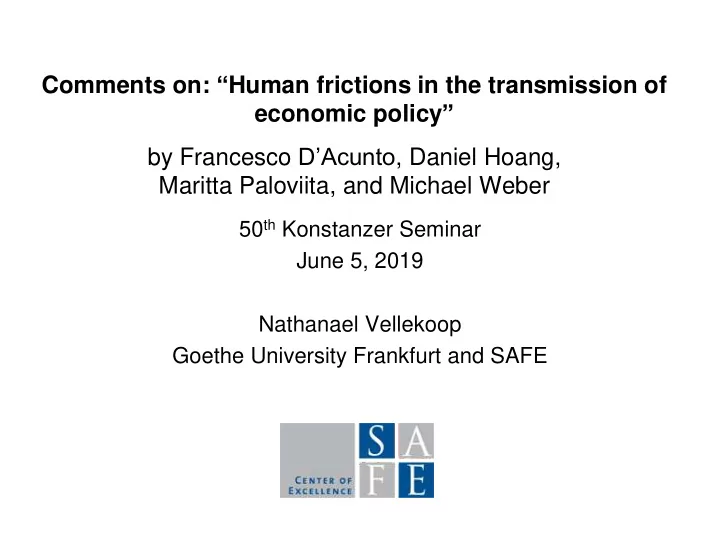

Comments on: “ Human frictions in the transmission of economic policy ” by Francesco D’Acunto , Daniel Hoang, Maritta Paloviita, and Michael Weber 50 th Konstanzer Seminar June 5, 2019 Nathanael Vellekoop Goethe University Frankfurt and SAFE
Summary of the paper – Link measures of IQ of Finnish men to: • Measures of “readiness to spend” and “propensity to borrow” (survey) • Changes in debt holdings (registry) – Finding #1: On average no relationship between inflation expectations and readiness to spend... ... but masks considerable heterogeneity by IQ – Finding #2: High IQ men are much more responsive to the economic environment in terms of debt and spending attitudes, and actual borrowing behavior 2
Contribution: Heterogeneity that matters – “Vintages” in micro heterogeneity 1. Risk and time preferences 2. Trust 3. Personality and IQ – Implications for theory Representative agent / aggregation – Implications for policy Should policy makers aim to tailor and target communication to particular subgroups? 3
A. Measure of IQ – Men at the age of 19-20 – Use the standardized scores of a composite: • Visuospatial • Mathematical • Verbal cognitive – Question Are the shares of these three in the total constant over the distribution? Any idea whether one in particular drives the results? – Suggestion IQ declines with age, but can be (partially) offset by experience 4 => Interaction between IQ and age
A. Measure of IQ (2) Figure 3 in Agarwal, Driscoll, Gabaix and Laibson (2009) Age of reason: Financial decisions over the life cycle and implications for regulation, Brookings Papers on Economic Activity 5
B. Interactions – Thought 1 No IQ data on women – Can lower IQ be compensated by marrying right? (What do we know about assortative mating on IQ?) • Could look at couples versus singles. • Could slice by education of spouse. – Thought 2 Scope for strategic complementarities? – Thought 1 would potentially decrease the impact of low IQ on poor decision making, 2 might exacerbate it – There might be more action in the higher moments 6 i.e. (very) differential responses to uncertainty / panics
C. Welfare – Thought 3 How costly is not responding to policy? Concept of near-rationality => individual utility losses are small + do not wash out in the aggregate Akerlof & Yellen, QJE 1985; Kueng, QJE 2018 – Caballero (JMCB 1995) calibrates a heterogeneous agents model where: • Some agents follow the PIH, and update continuously • Other agents are near-rational and update infrequently Estimated costs of not updating are small ( 0.03 – percent of PIH consumption, is coefficient of relative 7 risk aversion)
Thanks for the opportunity to discuss an interesting paper!
Recommend
More recommend